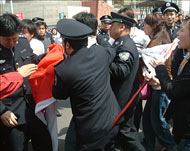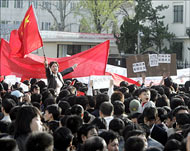Chinese protest over Japan history books
In the largest demonstration Beijing has witnessed for more than half a decade, up to 10,000 protesters have gone to the streets to vent frustration against the Japanese government.

Saturday’s demonstration comes after several weeks of nationwide protests, online petitions and calls to boycott Japanese goods.
The protests, begun as a campaign against Japan’s candidacy for United Nations Security Council membership, gained momentum after the approval this week of a new series of Japanese history textbooks that gloss over well-documented wartime atrocities.
It’s not the first time Japanese textbooks have sparked controversy. The books appear to offer justification for wartime actions and make little mention of massacres such as the Rape of Nanjing, where, according to Chinese figures, several hundred thousand civilians were killed by marauding Japanese soldiers.
After initial scuffles with police and soldiers, which ended with demonstrators locking arms and forcing their way through blockages, the authorities conceded defeat rather than risk violence for a cause that some police said they agreed with.
Trade pressure
Bringing traffic to a standstill, the mostly young crowd marched more than 15km across the city, culminating in throwing bottles and singing the national anthem outside a heavily defended Japanese Embassy.
 |
|
Japanese Prime Minister Koizumi |
“The main aim here is to get Japan to really think about what they did in World War II,” graduate student protester Liu Yu told Aljazeera.net. “One way we can do that is through the media, the other way is through not buying Japanese products.”
Despite being China’s second-largest trading partner and largest aid donor, political relations between the two countries have for several years been on ice.
China’s leaders, partly in a reaction to Japanese Prime Minister Junichiro Koizumi’s regular visits to the Yasukuni Shrine (a Tokyo war memorial that includes the names of convicted war criminals), have refused to visit their neighbour since 1998, leaving top-level contact to brief meetings during international forums.
Misunderstandings
“My observation is that people in China do not really understand what Japan is like,” a clearly frustrated Ide Kenji, spokesman for the Japanese Embassy in Beijing, told Aljazeera.net.
 |
|
The police later stopped trying to |
“After the war, we rejected the use of military force to solve problems and we resolved to help neighbouring countries with aid.
“People here are easily misled. Some people in Japan suspect the education system in China is to blame,” said Kenji, before adding that few people in Japan understood why there is such anti-Japanese sentiment in China.
Offering tacit support to the anti-Japan campaign by allowing popular web portals to carry the petition – which has attracted more than 20 million signatures – the Chinese government is wary of openly voicing opposition to Japan’s UN ambitions.
UN veto option
Unlike South Korea, which this week spoke out against Japanese Security Council membership after Korea’s claims to the Dokdo islands were disputed in one of the recently published textbooks, China (which holds a UN veto) appears to be keeping its options open.
“Though it is clear China does not want a Security Council rival in Asia, China would probably not deny Japanese membership if there is overwhelming majority support for Japan in the UN,” Reinhard Drifte, an expert on Japanese politics and author of Japan’s Quest for a Permanent Security Council Seat. A Matter of Pride or Justice?, told Aljazeera.net.
Apology and education
“There are three actions Japan should take,” says anti-China activist Lu Yunfei, whose website www.1931-9-18.org (the day Japan invaded northeastern China) has received more than 830,000 signatures.
 |
|
The Chinese are looking for the |
“They should make an official apology for the war. They should change their textbooks and so educate the younger generation on the true facts of the war, and they should stop visiting the Yasukuni Shrine,” says Lu, a 29-year-old IT designer by trade and representative of a new generation of Chinese who, empowered by China’s economic success, are advocating for a more assertive foreign policy.
Time required
China’s ambassador to the UN this week suggested that UN Secretary-General Kofi Annan’s original September timetable for agreement on Security Council reform should be extended.
Highlighting the need for consensus rather than a general assembly vote, Ambassador Wang Guangya, who holds the Security Council’s rotating presidency, said that as there were major differences, no timeframe should be set, thereby allowing member states more time to reach “a broad agreement”. Diplomatic parlance, says Drifte, to delay Security Council reform indefinitely.
“It is important that UN reform goes ahead and that China and Japan improve relations. If leaders are sensible, they can avoid the relationship from entering a vicious circle,” said Joseph Cheng of Hong Kong’s City University.
While characteristic of nations that are competing to be the dominant power in a region, Cheng worries that growing nationalist pressures in both countries will encourage governments to act tough rather than make conciliatory gestures.
China’s plan to commence drilling for resources in disputed territorial waters in the East China Sea is one potential flashpoint.
This would be a good moment, said Cheng, for China to pull back and offer an olive branch out to Japan.